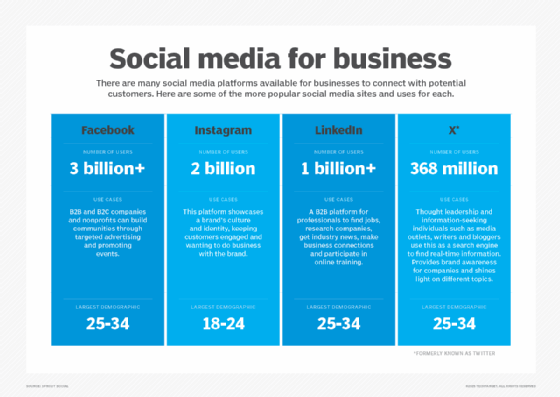social media influence
What is social media influence?
Social media influence is a marketing term that describes an individual's ability to affect other people's thinking in a social online community. The more influence a person has, the more appeal that individual has to companies or other individuals who want to promote an idea or sell a product.
Companies can harness social media influence to help generate brand awareness, sell inventory and increase customer engagement. This can be done by implementing a marketing strategy that focuses on increasing the company's own social media influence or by hiring established, trustworthy influencers in the space.
How to measure social media influence
At its most basic level, influence can be estimated by examining the size of a person's social networks, such as LinkedIn connections, Twitter followers or Facebook friends. A more thorough analysis is required, however, to determine how a person makes social connections, who those connections are and the level of trust between them.
Some experts advocate the use of social influence measurement tools -- now more commonly known as social media analytics tools. These include Sprout Social and Hootsuite.
Klout was a popular social influence measurement tool and used to provide a numerical score of 1 to 100 based on an individual's online activity on popular social networking sites. Some industry experts raised concerns about the validity of the metrics provided by Klout, however, pointing out that it did not measure all types of online activity. For example, a blog post from a trusted author could reach a small but highly-targeted audience and potentially be more influential than a simple tweet that reaches thousands of people.

What are social media influencers?
A social media influencer is a user that has established credibility in a certain industry or content type that has access to a wide audience. An influencer should have a large enough following and the power to spark a conversation and inspire an action or change in behavior. Companies can hire social media influencers to expand their social reach, become more relatable and sponsor products or services.
Types of social media influencers include the following:
- Celebrity influencers. These are the most well-known influencers, as they have acquired their following from their celebrity status. Since certain celebrities attract specific demographics and target audiences, companies that wish to reach those consumers can hire the celebrity influencer to promote or endorse their product to their fans.
- Consumer influencers. These are everyday people that have gained a following due to their personality and relatability. They are typically active on their social media through text posting, blogging, posting videos or photo sharing. Because their audience considers them "real" or "relatable," they tend to take their advice seriously, such as when they vouch for a service.
- Microinfluencers. Also known as expert influencers, these are everyday people that have gained a following and topical authority due to their knowledge in a specific area. When they recommend or praise a product, their audience is likely to trust their opinion.
- Content creators. These include professional bloggers, vloggers and photographers. Their role includes developing new content that readers are interested in keeping up with regularly. Part of a company's marketing strategy could be to send products to a content creator in the hopes they will review and speak positively about it to their followers. Another option is to write sponsored posts for their platform.
Before choosing an influencer, companies should consider a few qualities:
- how the influencer's personal message aligns with the company;
- how relevant the influencer's personal message is to the same target audience;
- how engaging the influencer is with the audience;
- how trustworthy the influencer is considered by the audience; and
- how big the influencer's reach or follower count is, which can help predict return on investment.
The impact of social media
Social media continues to grow as a form of communication and entertainment, meaning social platforms get more powerful as their memberships rise. Due to this, social media impacts society in the following ways:
- Generating visibility around social, ethical, environmental and political views or issues.
- Spreading educational material quickly and efficiently.
- Providing companies with new marketing opportunities.
- Creating new channels that companies can use to find, recruit and hire new employees.
- Increasing the number of social contacts of groups and individuals.
- Producing new jobs associated with social media networks and consulting.
- Allowing a platform for group discussion and opinion sharing.
Editor's note: This article was written in 2019. TechTarget editors revised it in 2023 to improve the reader experience.





